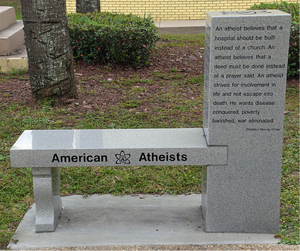Diversity in American Atheism
Yesterday’s post introduced the phenomenon of the new publicity of atheism and atheist organizations, as well as the issue of diversity. In today’s post, Stephen LeDrew discusses the particular case of atheism in America and the diversity that can be found in the American atheist movement, arguing that this diversity is directly related to the history of atheist and secularist organizations and the role that the internet has played in the development of contemporary atheist movement(s).
Atheism is much more diverse than many imagine. When popular intellectuals like Richard Dawkins, Sam Harris, and Christopher Hitchens began writing bestselling books about the evils of religion and appearing on television to make their case, a vision was crafted of atheism as a position of hostility toward religion that was grounded in scientific materialism. This ‘New Atheism’ came to represent atheism, and atheists, largely by default since there was no one else speaking on behalf of atheism at the time (or the ones that were speaking about it were heard by very few).
In the almost ten years since the phenomenon of the New Atheism began making waves in mainstream culture, we’ve learned a lot about atheists, more importantly that there are many different kinds, and that while their particular non-religious identity allows us to make some predictions about some of their other characteristics and beliefs, these correlations appear more and more tenuous. It’s true that, in America at least, atheists are more likely to be male, middle-class, university educated, and politically liberal.[1] But this is only the most likely scenario, and it says nothing about the diversity of ideologies and political views that many attach to their position on metaphysics – specifically, on God’s (non-)existence.
Take, for example, the emergence of a feminist movement within American atheism, which arose as a response to a woman at an atheist convention riding very late at night in the hotel elevator with another attendee who invited her to his room for coffee. More precisely, it was a response to the hatemail this woman, Rebecca Watson, received when she discussed the incident on her blog and indicated that it made her uncomfortable. The torrent of hostile comments directed at her on her blog and on Twitter, mostly from other atheists, began a chain reaction (which quickly became known as ‘Elevatorgate’) that involved many movement leaders and influential figures—including no less than Richard Dawkins—telling Watson that she was over-reacting, and that in general western women have nothing to complain about since their situation is so much better than that of women in, say, Saudi Arabia.[2]Here is Dawkins’ infamous comment that helped the discussion to blow up into Elevatorgate:

Many atheists found these views sexist, patriarchal, and generally disturbing, and women in the movement began speaking out about their experiences of sexual harassment and discrimination at atheist events. Elevatorgate and its aftermath eventually led to the formation of a new group of atheists called ‘Atheism Plus’ that wanted to turn the movement’s attention to issues of social justice and equality (mostly with respect to gender, sexuality, and race – even “social justice atheists” rarely mention class, capitalism, or much of anything to do with economics).[3]
At the other end of the spectrum, there is a conservative group of mostly white men who connect atheism and secularism to economic libertarianism. Darwinistic visions of capitalism acting as a field where natural selection propels economic growth are legitimation for deeply individualistic—or better, selfish—ideologies of secular utopias. One notable proponent of such views is Michael Shermer, publisher of Skeptic magazine and a monthly columnist for Scientific American, who argues that a free market capitalist system has an inherent morality derived from nature. In 2009, Shermer argued in an interview on Point of Inquiry (the radio show of the Centre for Inquiry, one of the largest atheist organizations in America) that state support for the unemployed should be abolished and he defended increasing wealth disparity as a symptom of a healthy economy. In the same interview, the interviewer noted that many of the ‘big guns’ in the American atheist movement are libertarians.[4] Criticism of religion, for Shermer and other libertarian atheists, often takes a back seat to criticism of the state. One might suspect that their only opposition to religion is that the Christian Right is so influential on government, since at heart their politics are similar in many respects to those of right-wing American Christians, and the differences are in many cases superficial.

In between the two extremes of Atheism Plus and libertarian atheists there are atheists who hold to more traditional conceptions of what their movement is about, emphasizing the pursuit of civil rights and a stronger voice in the public sphere. Still others are not so politically oriented at all, but are interested in atheist groups as a form of community, taking pleasure in being with others with whom they share a characteristic that has long been (and in various places, still is) uncommon and taboo in America.
While physical gatherings are still important sources of community, the online world is where much of the interaction among atheists takes place. The internet brought a latent identity group into being by making connections and interactions between geographically dispersed populations of atheists possible. But its decentralized structure has also made uniting this group behind a common set of goals or ideas very difficult because it makes the expression of a diversity of viewpoints possible. The traditional structure of leaders and members is obliterated in an era when the means of communication are available to anyone with an internet connection.[5]
We should be careful, however, about laying all of these issues and problems at the feet of digital technology. No doubt it has facilitated the expression of a diversity of views that come into conflict, and the depersonalized and potentially anonymous nature of online interactions may enable some of our more aggressive tendencies, so that ‘debates’ quickly spiral out of control into outright feuds, and much worse. But at the same time, many of the tensions that are shaping organized atheism today have been present since the first atheist and secularist organizations emerged in the 19th century.[6]Militant atheists set to complete the project of Enlightenment and rid the world of religion by replacing it with a scientific worldview have come up against humanistic atheists who promote secular ethics and mutual understanding for as long as these groups have existed. The founder of the National Secular Society (originally called the Central Secular Society) in Great Britain, George Holyoake, connected the atheist ideas of his organization to, among other things, “the rectification of the inequalities of the human condition” and “the mitigation of harsh destiny” of those less fortunate in this life.[7] In this regard Holyoake was a socialist whose freethought periodicals sometimes addressed issues of labor, exploitation and resistance to capitalism. Holyoake was not afraid of working together with liberal Christians to promote the cause of secularism. As a result he ended up in conflict with a group of less compromising atheists under the leadership of Charles Bradlaugh, for whom working together with believers was a betrayal of the movement and who eventually took over leadership of the NSS.[8]
Debates about whether atheists should be open to cooperation with religious groups have thus already been ongoing for over a century. The ambitious evangelical approach that came about in the era of the New Atheism was new, but it has ceded way to the more traditional strategy of representing atheists as a minority and setting their concerns within the context of the civil rights movement, and differences of opinion about how to approach this at a tactical level—legal challenges to infringements of church-state separation versus the more gentle striving for acceptance at the cultural level, for example—have persisted for decades.[9]
In a sense all of this is nothing new, though technology has perhaps made the differences more acute (this is in line with the surprising result of the internet, which, contrary to many early claims about its democratizing potential to unite a global public, has proven to also be a powerfully divisive instrument that might actually increase separation and isolation of different groups since there is no central information source that must strive to represent all points of view). The atheist movement in America is in a transitional phase right now, with the excitement generated by the New Atheism giving way to the question of what exactly their purpose is. There are answers to this question—perhaps too many answers, and the result is a movement that is significantly divided and fragmenting into smaller special interest groups. Some of the overarching goals and bigger groups remain intact, though the surge in membership in recent years may be over as atheists devote themselves to more focused groups and causes. The future is uncertain, but the impact of the New Atheism has been lasting, and if nothing else, we have seen the establishment of a new minority group in American society.
Stephen LeDrew is a postdoctoral fellow at the Centre for the Study of Religion and Society of Uppsala University. He authored the recently published The Evolution of Atheism: the Politics of a Modern Movement (Oxford university press, 2015). Steve can be reached at stephen.ledrew teol.uu.se or at his website, http://www.stephenledrew.com.
[1] Ryan T. Cragun, “Who are the “New Atheists”?, in: Lori G. Beaman & Steve Tomlins eds., Atheist Identities: spaces and social contexts, Springer 2015, 195-211.
[2] Mark Oppenheimer, Will Misogyny bring down the atheist movement?, http://www.buzzfeed.com/markoppenheimer/will-misogyny-bring-down-the-atheist-movement, last accessed 2 November 2015.
[3] http://thejenome.com/atheism/atheism/, last accessed 2 November 2015.
[4] Stephen LeDrew, The Evolution of Atheism: The politics of a modern movement (Oxford university press 2015), 188-192.
[5] Richard Cimino and Christopher Smith, Atheist Awakening: Secular Activism and Community in America (Oxford University Press, 2014).
[6] LeDrew, The Evolution of Atheism, 95-105.
[7] Quoted in Colin Campbell, Toward a sociology of irreligion (London 1971), 48.
[8] LeDrew, The Evolution of Atheism, 98.
[9] Richard Cimino & Christopher Smith, “Secular Humanism and Atheism: beyond progressive secularism”, Sociology of Religion 68:4 (2007), 407-424.

